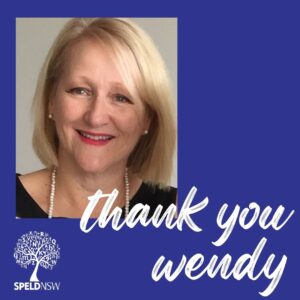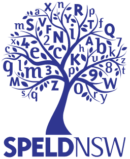 Thank you, Wendy Coggins*, SPELD NSW Professional Member, for an incredible 30 years.
Thank you, Wendy Coggins*, SPELD NSW Professional Member, for an incredible 30 years.
This month we are thrilled to acknowledge SPELD Professional Member Wendy Coggins on her 40 year career in speech pathology. Here we share a little bit more about her career highlights.
As Wendy retires, SPELD NSW sadly farewells her after three decades as a SPELD NSW Professional Member. Wendy joined SPELD NSW in the 1990s and was involved in the early days of the SPELD NSW Teachers Certificate Course.
SPELD NSW members may remember Wendy’s presentations about “Speech Pathology Reports – What do they mean and what can you do in the classroom?” and “Optimising Language for Learning Across the School Years”.
The SPELD NSW Teachers Certificate Course is our signature professional development course and we were delighted to involve a speech pathologist with Wendy’s experience from the early days.
Wendy strengthened her ties to SPELD via Honorary Life Member Lin Meeks, author of the Ants in the Apple program.
“I found an organisation that was client focused and therefore prepared to use the best resources to help struggling students. I was lucky enough to know Lin Meeks and she was aware of the emerging skill set which Speech Pathologists could bring to students with Specific Learning Difficulties. This led to an eight year involvement with the SPELD Teachers Certificate Course from 2012-2019.”
Involving a Speech Pathologist in the Teachers’ Certificate Course meant that participants gained much needed information from a speech pathology perspective about the links between oral language and literacy development, as well as practical classroom strategies. In more recent years speech pathologists are increasingly sought after by schools to support students. Unfortunately, New South Wales is one of the only states which does not routinely employ speech pathologists directly. SPELD NSW aims to bridge this gap by sharing the best practice and knowledge of our professional members with schools and teachers.
Over 35 years collaborating with teachers to support students
“Over my career, it has been a privilege to help thousands of clients in individual sessions, to improve their speech, language and literacy skills for more positive academic, social and ultimately mental health outcomes” said Wendy.
Additionally, Wendy reflects on her paediatric speech pathology career and the wonderful collaborations she created working with schools and teachers within the classroom.
“I am proud of the teacher collaboration achieved by working in over 30 schools, and particularly three key independent schools. This paved the way for speech pathology led, whole class programs in oral language, spelling and vocabulary, plus regular screening programs. These in turn benefited hundreds of students. Moreover, I hope for those teachers involved, it has set a precedent of the worth of collaboration between teachers and speech pathologists in schools. Paraphrasing one teacher’s comments: “Seeing strategies at work in the classroom was the best PD ever.”
Within weeks of Wendy retiring from private practice, the NSW Education Department released a Learning Resource Hub with assessments to support teachers in identifying the reading behaviours and strategies of their students. This follows the introduction of the Year One Phonics Check in NSW and mandatory phonics in the new NSW Curriculum. These steps are positive initiatives that will give more students access to the type of support and intervention Wendy has been providing for many many years.
“I have been delighted to present over 30 in-services since 2005, mostly to teachers, empowering and supporting them with strategies to address the needs of varied learners, including those with specific learning difficulties.”
A brighter future for students in New South Wales
As we move into 2022, Wendy is optimistic for families navigating the education system with children with specific learning difficulties. She hopes the ongoing positive developments in education reform will lead to sound, explicit teaching and fewer instructional casualties in literacy.
“The new NSW English curriculum for Stage 1 recognises the importance of oral language as a foundation skill for literacy development, supports phonological awareness, the teaching of phonics and the use of decodable texts. Teachers are seeking help and further training to teach literacy effectively. Consider for example, the number of teachers taking up ‘Sounds-Write’ training.”
Wendy has also seen that more schools are purchasing decodable readers. Parents have access to advocacy groups such as SPELD and better information available online.
SPELD NSW Referral Database – Essential for Speech and Language Pathologists working with school aged children
SPELD NSW has an amazing number of professional members supporting students through the Referral Database. We acknowledge and thank Wendy for her years of service particularly in supporting individual students.
“I would say that joining the SPELD NSW Referral database is essential for Speech Language Pathologists working with school aged populations. The SPELD referral service helps match struggling students with a professional who is skilled and passionate about developing the student’s individual speech, language and literacy skills to achieve learning success. For the professional, being a SPELD member allows access to up- to -date information and perspectives from teachers, parents and other professionals who are equally committed to advocating for students with specific learning difficulties.”
Early career and introduction to Lindamoods, literacy and learning difficulties
Wendy began her career at Parramatta Hospital in 1981 with an adult caseload of head injury and stroke patients within a team rehabilitation setting.
“Thinking about the underlying neurology of communication disorder has therefore, always been important to me. When Parramatta Hospital combined with Westmead Hospital in 1983, I was fortuitously ‘rotated’ into Paediatrics at Westmead. Besides working with children with head injuries, prematurity, cerebral palsy and developmental speech and language delays, I regularly worked on Dr Simon Clarke’s “Learning Difficulties” clinic where my love for this field began.”
At this time, Wendy tells us that literacy was a controversial area for Speech Pathologists but the links between speech and phonics as well as language and reading/written expression were clear.
“In the mid 1980’s, Westmead Hospital Speech Pathology Department hosted Pat and Charles Lindamood, who were early pioneers of a structured, multisensory program linking speech to reading and spelling. After “hands on” training, the early Lindamood program (now called LiPS) was then used for individual and group therapy for clients who had been diagnosed with Specific Learning Difficulties. As part of my role as Senior Paediatric Speech Pathologist at Westmead Hospital, one of my first lectures which I presented for SPELD, was about this ‘new’ Lindamood Program.”
What’s next?
Wendy will probably always be keeping an eye on her profession from afar. Her one long term professional disappointment is for those students with Developmental Language Disorder (DLD). Support for these 7% of children with difficulties understanding and speaking their first language, has not kept pace with support for Specific Learning Difficulties nor Autism Spectrum Disorder. With greater worldwide recognition of DLD and increasing supports, Wendy hopes children with DLD will have more help at school.
But for now, Wendy is looking forward to spending time with family, travelling Australia and learning Italian. We wish Wendy all the best for a beautiful relaxing summer and her next adventures.
*Wendy is a member of Speech Pathology Australia. Her views do not necessarily reflect those of Speech Pathology Australia.




